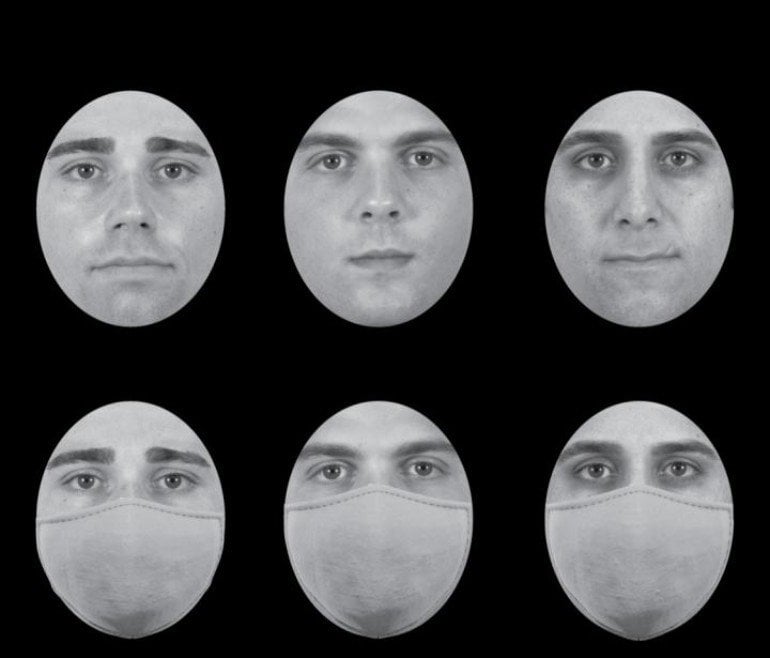Summary: It may be harder to recognize familiar faces when they wear a surgical mask to protect against COVID-19, a new study reports. Researchers noted a 15% drop in the ability for people to recognize faces when they were masked.
Source: Ben-Gurion University of the Negev
The identification of people wearing masks has often presented a unique challenge during the pandemic. A new study by researchers from Ben-Gurion University of the Negev (BGU) in Israel and York University in Canada reveals the impact of this predicament and its potentially significant repercussions.
The findings were just published in the journal Scientific Reports.
“For those of you who don’t always recognize a friend or acquaintance wearing a mask, you are not alone,” according to the researchers Prof. Tzvi Ganel, head of the Laboratory for Visual Perception and Action at the BGU Department of Psychology, and Prof. Erez Freud, who earned his Ph.D. at BGU and is now a faculty member at York University in Toronto, Ontario.
“Faces are among the most informative and significant visual stimuli in human perception and play a unique role in communicative, social daily interactions,” the researchers note. “The unprecedented effort to minimize COVID-19 transmission has created a new dimension in facial recognition due to mask wearing.”
To examine the effects of wearing masks, Prof. Ganel and Prof. Freud used a modified version of the Cambridge Face Memory Test, the standard for assessing facial perception, which included masked and unmasked faces. The study was conducted online with a large group of nearly 500 people.
The researchers found that the success rate of identifying someone wearing a mask was reduced by 15%. “This could lead to many errors in correctly recognizing people we know, or alternatively, accidently recognizing faces of unfamiliar people as people we know,” says Prof. Galia Avidan who is a member of the BGU Department of Psychology and the Department of Cognitive and Brain Sciences, and an expert on facial recognition and perception. “Face masks could be even more challenging to people whose face recognition skills are not ideal to begin with and cause greater impairment.”
The research team also found that masks specifically interfered with extracting a holistic impression of faces and led to feature-by-feature processing which is a less accurate and more time-consuming strategy.
“Instead of looking at the entire face, we’re now forced to look at eyes, nose, cheeks, and other visible elements separately to construct an entire facial face percept – which we used to do instantly,” the researchers say.
These changes in performance, along with the alteration along the processing style of faces, could have significant effects on activities of daily living, including social interactions, as well as other situations involving personal interactions, such as education.

“Given that mask wearing has rapidly become an important norm in countries around the globe, future research should explore the social and psychological implications of wearing masks on human behavior,” Ganel says. “The magnitude of the effect of masks that we report in the current study is probably an underestimation of the actual degree in performance dropdown for masked faces.”
In addition to the BGU researchers, the Canadian team included Prof. Erez Freud who led the study, Andreja Stajduhar, and Prof. Shayna Rosenbaum of York University Department of Psychology and the Centre for Vision Research.
Funding: This study was supported by the Israel Science Foundation (Grant no. 296/15) and by the Vision Science to Applications (VISTA) program funded by the Canada First Research Excellence Fund (CFREF, 2016-2023) and by the Natural Sciences and Engineering Research Council of Canada.
About this neuroscience research news
Source: Ben-Gurion University of the Negev
Contact: Andrew Lavin – Ben-Gurion University of the Negev
Image: The image is credited to Chicago Face Database (Ma et al., 2015)
Original Research: Open access.
“The COVID-19 pandemic masks the way people perceive faces” by Erez Freud, Andreja Stajduhar, R. Shayna Rosenbaum, Galia Avidan & Tzvi Ganel. Scientific Reports
Abstract
The COVID-19 pandemic masks the way people perceive faces
The unprecedented efforts to minimize the effects of the COVID-19 pandemic introduce a new arena for human face recognition in which faces are partially occluded with masks. Here, we tested the extent to which face masks change the way faces are perceived. To this end, we evaluated face processing abilities for masked and unmasked faces in a large online sample of adult observers (n = 496) using an adapted version of the Cambridge Face Memory Test, a validated measure of face perception abilities in humans. As expected, a substantial decrease in performance was found for masked faces. Importantly, the inclusion of masks also led to a qualitative change in the way masked faces are perceived. In particular, holistic processing, the hallmark of face perception, was disrupted for faces with masks, as suggested by a reduced inversion effect. Similar changes were found whether masks were included during the study or the test phases of the experiment. Together, we provide novel evidence for quantitative and qualitative alterations in the processing of masked faces that could have significant effects on daily activities and social interactions.






